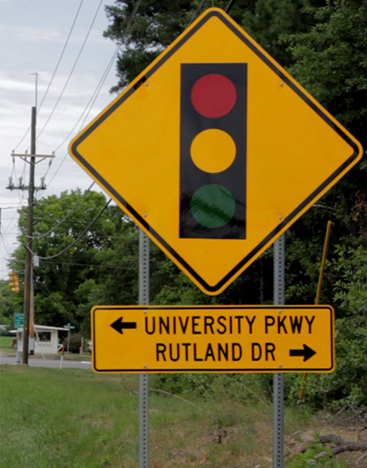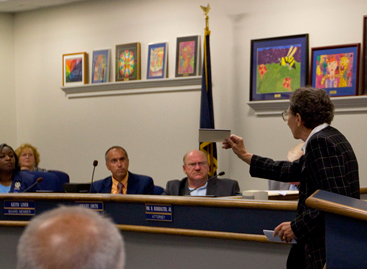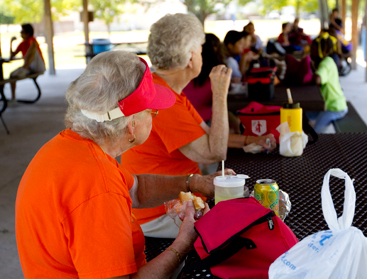In Aiken, S.C., the Age Wave of the Future Is Here Today
-
With the temperature already above 95, the air conditioning is blasting on the Pony Express, a local Council on Aging bus service for elderly riders in Aiken, S.C. As more than a dozen seniors arrive at the council's headquarters for a church service and lunch on this Friday morning, they step, one by one, onto a hydraulic lift that lowers them and their walkers and canes to the ground, where they are escorted into the large, sun-soaked room.
Inside, the gospel group Praise Team plays a lively version of "Every Time I Turn Around," as the audience sings along.
The Pony Express and the similar Best Friend Express provide a valuable service for older people who can no longer drive. It's one of a number of steps Aiken has taken to adapt to a ballooning senior population. "With growth, there are going to come things that you have to deal with," says William Price, a school principal and member of Aiken's recently formed Senior Commission. "Individuals are living longer, and we certainly have to prepare for that."
When it comes to senior issues, Aiken is in the vanguard; it has already begun to grapple with what the nation as a whole will soon face. By 2050, the proportion of Americans over 65 is projected to reach 20.7 percent. But in Aiken, it's already 21.9 percent, giving this small town near the Georgia border a 40-year head start on these issues. For its size — Aiken has just over 29,000 residents — the city has shown some foresight with the potential problems and benefits in its future. But as its population continues to age, it still has a lot to figure out.
In the 1950s, thousands of workers flocked to Aiken to take jobs at the Savannah River Site, a nuclear refinement plant that is still one of the area's main employers. The charming downtown, tree-lined esplanades, low taxes and multiple golf courses caused people to stick around after retirement.
"Its geographical location is ideal," says John Strother, who fell for it when he visited in 2003. "It just has so many pluses." Aiken, its boosters point out, lies within two and a half hours of mountains, popular beach resorts like Hilton Head, and bigger cities like Charleston. Residents talk about the thriving equestrian community and the county's 50 polo fields.
Seeing the demographic future, last year Aiken formed a seven-member senior commission to advise the City Council and Mayor Fred Cavanaugh. It has held three introductory, brainstorm-style meetings, and created an agenda of nine areas to focus on. Transportation and access to health care top the list.
On the health front, Aiken — like the country as a whole — faces a shortage of doctors who treat the elderly, including geriatricians, internists and primary care physicians. The resulting long waits for appointments and in doctors' offices can be particularly hard on the elderly. So the Aiken Regional Medical Center dangles incentives to lure new doctors to the area, as other underserved communities also do, offering them expense reimbursements and guaranteeing them a salary for at least one year while their practices take root.
"Had those factors not been in place we would have stayed exactly where we were," says Dr. Dan Dillon, a neurosurgeon who relocated to Aiken last June from Virginia Beach. He says he was acutely aware of the older demographic before making the move.
"Because of the demographic down here, I'm getting 75 percent Medicare patients. I'm not advertising to the elderly, it's just what walks through the front door." The program has recruited 52 doctors since 2002.
Recruiting can still prove hard because of a high percentage of elderly patients, who typically have multiple chronic diseases and complicated medical situations. More than 50 percent of the hospital's in-patients are over 65.
"Physicians want a healthy balance of a payer mix, different types of patients in their practice," says Hagan.
Hospital administrators hope that perks like warm winters and housing developments built around golf courses, along with the financial perks, will attract more doctors.
Aiken has also adopted certain public safety measures with an eye toward its seniors. A free service called Smart 911 allows residents to sign up to have critical medical information – including medications taken and family contact numbers – displayed to emergency personnel when a call comes in from a participant's phone. More than 3,000 people in Aiken County have signed up since June. Cathy Randall, a coordinator at Aiken County Emergency 911, signed up her 79-year-old mother, Melba Jeffcoat, who has dementia.
"If I got to her house and she was missing, I could have called from her phone and they would see all her information, including a picture," she says. That photo could be sent immediately to police, who "could start searching before they arrived at the scene."
Aiken's Public Safety Department also uses GPS bracelets from Project Lifesaver International, a nonprofit organization, to locate dementia patients who wander. Last winter, a bracelet helped the police rescue an 86-year-old man who had wandered barefoot into the woods in 30-degree weather.
The town is updating its road signs. Ahead of a federal nationwide mandate, Aiken has already installed oversized street signs downtown and on major thoroughfares; they're intended in part to help older drivers who may not see as well as they used to.
Despite these efforts, Aiken is still facing difficulties in serving the needs of its senior population. Significant cuts to the county's Council on Aging – its $2 million operating budget is nearly 30 percent below recent years because of reduced federal and state financing – have diminished its ability to provide meals and transportation to nearly 1,500 elderly people across Aiken County, says Scott Murphy, its director. "Every one of the programs and services that we offer, we are maxed out," says Murphy.
"With the economy the way it is, and with the baby boomers retiring now and old people moving into communities, we've got the phone ringing off the hook." But with less revenue, "we are unable to step up and meet those demands."
That's why Meals on Wheels staffers, like Sonya Moody, are driving routes in addition to their administrative workloads. There aren't enough steady volunteers to make all the deliveries; moreover, the program's budget has been cut by 20 percent each year since 2008 leading to the waiting list doubling to nearly 650 people. "If there are no volunteers, then I'm out there," says Moody, while delivering meals to the poorer north side of Aiken, where she is often greeted with hugs. "The only reason a client does not get a meal is that they're not home."
Local financing for senior programs doesn't look likely to increase anytime soon: Proposed tax increases have caused friction, in which intergenerational differences may play a role. Last year for the first time in recent memory, a school bond referendum for $236 million failed to pass; some local residents attribute it to the older population, which is growing.
At a school board meeting this spring, about 50 people turned out to dispute a separate proposed increase that would have added $36 a year to property taxes for every $100,000 assessed valuation.
Seated in the front row chanting "Amen" throughout the meeting were silver-haired opponents, most of them members of We the People, a local Tea Party affiliate. Carolyn Bazzle, 67, pulled out her latest Social Security check and strode over to show it to the board as she glared over her wire-framed glasses. "We are hurting and we are on a fixed income," she declared.
A local artist who supported the new tax increase went as far as to place near life-size posters of We The People leaders in her front lawn, alongside a dinosaur representing educational opportunity.
The tax never went to a vote. But Shiva Aiken and her husband, Wes, two of the younger faces at the meeting, still worry that the town's growing retiree population, which has high voter turnout, will balk at supporting public schools. "When the school bond referendum failed and everybody was like 'Holy crap, this has never happened,'" says Wes Aiken. "The majority of people who went out and voted were retirees."
Yet if an aging population presents challenges for the nation, it also presents opportunities, especially in volunteerism. At Aiken's Red Cross chapter, 45 of its 170 volunteers are seniors; so are about 6 out of 10 blood donors and many Meals on Wheels drivers.
To help older people pass their wisdom along to younger generations, Aiken has adopted the Foster Grandparents program, which pays seniors $2.65 an hour to read with children during the school year and chaperone summer recreation programs.
"It keeps me busy, it keeps me going, driving, active," says participant Liliane Crockett, 81. "If I can touch any child's life, that's one reason that I'm here."





